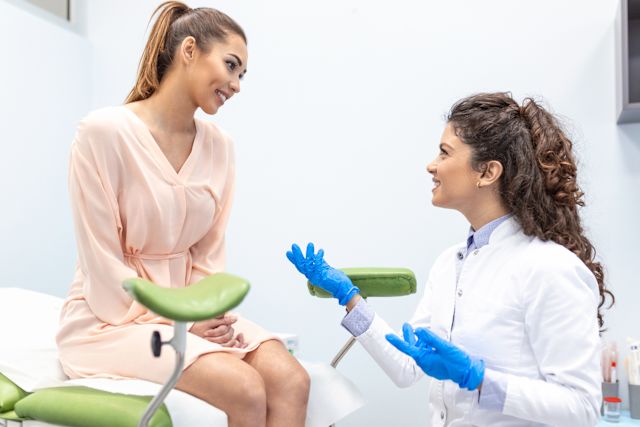Updated on October 3, 2025.
The HPV vaccine helps to protect against the virus responsible for most cervical cancers. Since its approval in United States, cervical cancer cases and deaths in women ages 25 and younger have dropped significantly.
While that’s certainly cause to celebrate, following screening guidelines for the disease remains critical. More than 13,000 new cases of cervical cancer are diagnosed each year, and it leads to about 4,000 deaths. Since there are often no symptoms until the cancer has advanced, screening is vital to early diagnosis and treatment. You should still be screened if you’ve received the HPV vaccine.
To screen for cervical cancer, the American College of Obstetricians and Gynecologists (ACOG) recommends a Pap test every three years for people between the ages of 21 and 29. It is also sometimes called a Pap smear.
Between ages 30 and 65, the recommendations change. A person may:
- Continue getting a Pap test every three years
- Receive a Pap test with and a human papillomavirus (HPV) test every five years
- Have HPV testing alone every five years
At age 65, if you’ve never had cervical cancer or abnormal cervical cells and you’ve had two or three normal tests in a row, ACOG says you may stop screenings. Some older people may want to continue. In that case, speak with a healthcare provider about whether it’s the right choice for you.
What your Pap test results mean
Pap test results are usually described as:
- Normal: no changes in cervical cells
- Unclear: cervical cells might be abnormal
- Abnormal: cell changes found
Relatively few Pap test results are abnormal. "It's actually not that common," explains Glenn Bigsby, DO, a gynecologic oncologist in Littleton, Colorado. "Probably about 10 to 15 percent of patients in general will have an abnormal Pap smear during their lifetime."
If you do get "abnormal" results from your Pap test, it means that some cells from your cervix look different than healthy cells. While it does not necessarily mean that you have cancer, more monitoring, testing or treatment may be needed. Here are some possible reasons for abnormal Pap test results.
HPV
The biggest risk factor for an abnormal Pap test is HPV, a sexually transmitted infection that can lead to cervical cancer. Getting the HPV vaccine can "significantly decrease your risk of getting HPV, and/or an abnormal Pap smear," Dr. Bigsby explains. Experts recommend the vaccine for all young people ages 9 through 26, though in certain cases, some people may receive it up to age 45.
Infection
Sometimes a vaginal yeast infection will throw off a Pap test result. "The test is not designed to diagnose infections," says Bigsby. "They’re just sometimes found at the time of the Pap smear." If you have a yeast infection, your healthcare provider (HCP) can recommend appropriate treatment.
Menopause
People in menopause may have abnormal Pap results caused by vaginal dryness or thinning of the walls of the vagina or cervix. These changes are triggered by the loss of estrogen during menopause and are not related to HPV or cancer.
Potential additional testing
If your Pap results are abnormal—or even unclear—your HCP may order one or more of these tests to determine if there are precancerous or cancerous cells.
Repeat Pap
Sometimes a Pap test shows irregular cells called atypical squamous cells of undetermined significance, or ASC-US. Often these cells are caused by inflammation, and they'll soon return to normal on their own. "We’ll repeat those Pap smears in a short amount of time, just to be sure," Bigsby says.
HPV test
This test can be done either as part of regular screening, or if your Pap shows irregular cells. The test looks for pieces of HPV DNA within cervical cells, and the cells are collected the same way as the Pap—in fact, they may be done with the same sample.
Colposcopy
"A colposcopy is a more directed diagnosis of precancerous cells," says Bigsby. The procedure takes 10 to 20 minutes in your HCP’s office. Just like a pelvic exam, you’ll lie on an exam table with your feet propped on footrests. Your HCP will position a speculum in your vagina to view and examine your cervix with the help of a special magnifying device called a colposcope. Your HCP will also swab a solution on your cervix to highlight irregular cells, which could cause some stinging or tingling.
Biopsy
There are several types of cervical biopsies, but all involve taking a sample of tissue to check for signs of developing cancer. (Some people may feel some pressure or cramping during the test.) The biopsy can confirm if precancerous or cancerous cells are present. If so, these cells will need to be treated either by excision (removal of cells for further evaluation in the lab) or ablation (destruction of cells either by freezing or with lasers, without further evaluation of these cells in the lab).
Afterwards, you will need to continue routine cervical cancer screening. Depending on the type of abnormal cells found on biopsy, you may need more frequent screening or further treatment.







